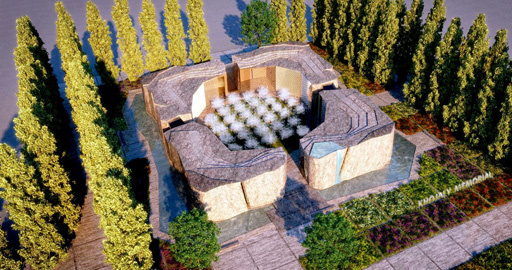Khojaly genocide memorial under construction in Baku

By Sara Rajabova
Work on creating a new memorial complex dedicated to the Khojaly genocide committed by Armenian armed forces against Azerbaijani civilians during the 1990s war has started in Baku.
The Heydar Aliyev Foundation said on May 15 that the establishment of the Memorial Complex, which is being built under a project of the Foundation, aims to perpetuate the memory of the Khojaly genocide victims and to bring to the world community's attention the truth about this tragedy.
Parliament Speaker Ogtay Asadov said at the May 14 meeting of the parliament that after the completion of the construction operations, visits to the monument will be included into official protocols.
Under a relevant concept, trees which blossom in late February will be planted in the courtyard of the complex. This symbolizes the broken lives of the innocent people who were killed in February 1992.
A rectangular monolith surrounding the complex from four sides is in the shape of symbolic hands seeking to protect the residents of Khojaly from genocide.
The layout of the Memorial Complex is currently on display within the "Mini-Azerbaijan" project conducted at the Heydar Aliyev Center.
The layout of the Memorial Complex was submitted to Azerbaijani President Ilham Aliyev. The President familiarized with the project and issued relevant orders on the construction of the complex.
The Memorial Complex will present the facts pertaining to the killing of 613 people in Khojaly by the Armenian armed forces jointly with an infantry regiment of Russian troops on February 25-26, 1992, and the complete destruction of the city.
The composition of the complex, the atmosphere created there and the submitted materials will allow people to fully grasp the essence of the gruesome Khojaly events and the horrors of the tragedy.
The complex dedicated to the Khojaly genocide is being constructed near the "Mother's Cry" monument, which was erected to eternalize the memory of the Khojaly victims.
The Heydar Aliyev Foundation consistently takes action aimed at informing the world community about the Khojaly genocide and recognition of the developments as genocide committed against the Azerbaijani people.
As a result, the scope of coverage of the realities on the Khojaly tragedy expands year-on-year and the number of countries recognizing those crimes as genocide is increasing.
Thus, the resolutions on the Khojaly tragedy have been passed in the parliaments of Turkey, Pakistan, Mexico, and Colombia, as well as the Organization of Islamic Cooperation (OIC).
This year, such resolutions have been adopted in the parliaments of the Czech Republic, Romania, Serbia and Bosnia and Herzegovina.
Besides, the U.S. states of Connecticut, West Virginia, Massachusetts, Texas, Maine, New Jersey, Georgia, New Mexico, Arkansas, Mississippi, Oklahoma, Tennessee and Pennsylvania recognized the Khojaly massacre.
The establishment of the Memorial Complex dedicated to the Khojaly genocide is another step in conveying to the international community the crimes committed by the Armenian armed forces during the invasion of Azerbaijani lands as well as the perpetuation of the Khojaly genocide in the memory of future generations.
Late into the night of February 25, 1992, the town of Khojaly, situated within the administrative borders of the Nagorno-Karabakh region of Azerbaijan, came under intensive fire from the towns of Khankendi and Askeran already occupied by Armenian armed forces. The Armenian forces, supported by the ex-Soviet 366th regiment, completed the surrounding of the town already isolated due to ethnic cleansing of the Azerbaijani population of the neighboring regions. The joint forces occupied the town, which was ruined by heavy artillery shelling.
Thousands of fleeing civilians were ambushed by the Armenian forces. Punitive teams of the so-called Nagorno-Karabakh defense army reached the unprotected civilians to slaughter them, mutilating some of the bodies. 613 civilians, including 106 women, 70 elderly and 83 children, were killed in the massacre. A total of 1,000 civilians were disabled. Eight families were exterminated, and 25 children lost both parents, while 130 children lost one parent. Moreover, 1,275 innocent people were taken hostage, while the fate of 150 remains unknown.
Here we are to serve you with news right now. It does not cost much, but worth your attention.
Choose to support open, independent, quality journalism and subscribe on a monthly basis.
By subscribing to our online newspaper, you can have full digital access to all news, analysis, and much more.
You can also follow AzerNEWS on Twitter @AzerNewsAz or Facebook @AzerNewsNewspaper
Thank you!
